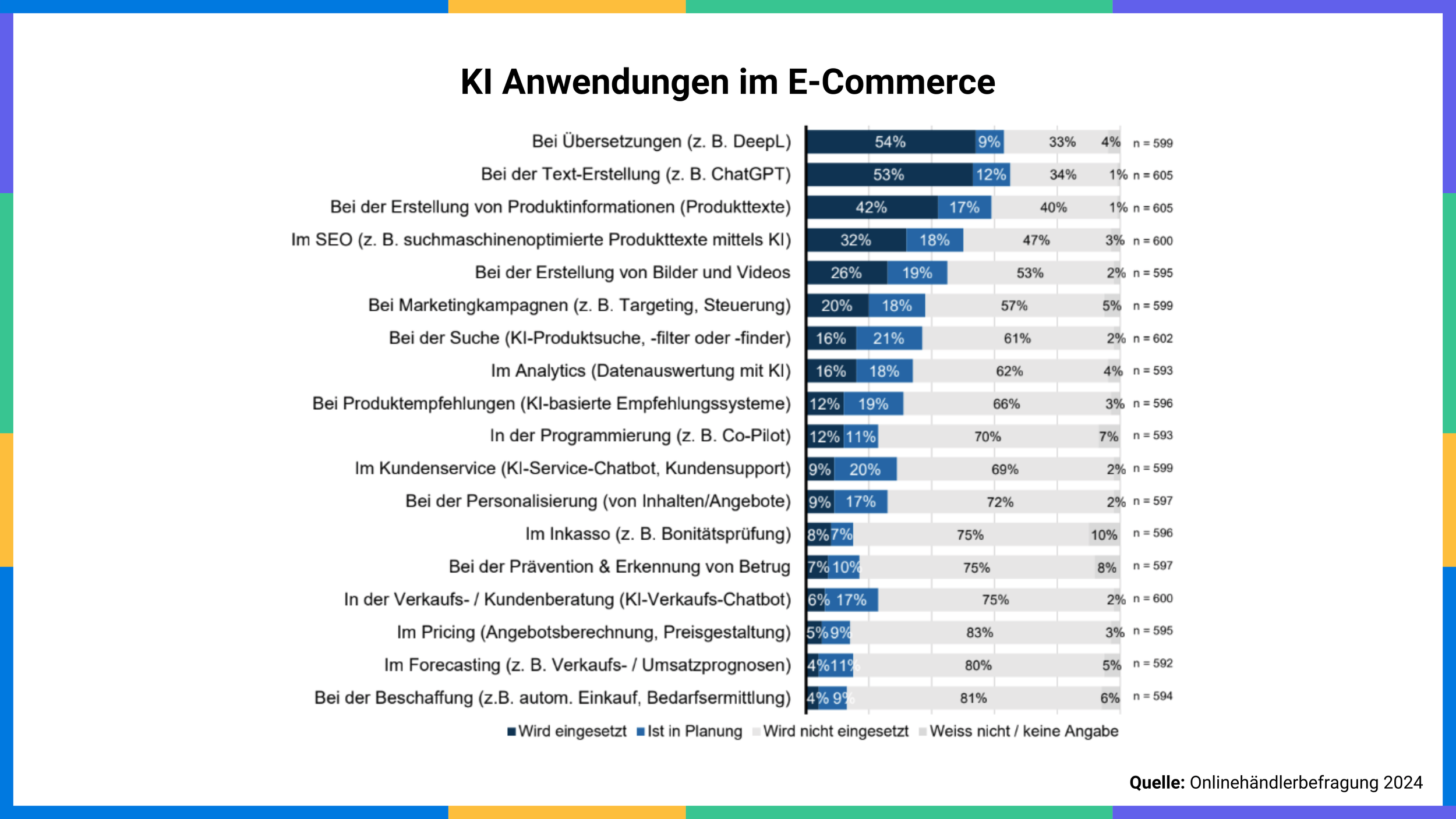6 AI tools in e-commerce: which technologies help retailers move forward
The world of e-commerce is changing rapidly - and artificial intelligence (AI) is playing an increasingly important role. From personalized shopping experiences to automated customer service and fraud prevention: AI technologies help online retailers to work more efficiently and thus save valuable time in many ways.
According to the Online Retailer Survey 2024 conducted by the Zurich University of Applied Sciences (ZHAW) and the University of Applied Sciences and Arts Northwestern Switzerland (FHNW), more than half of the retailers surveyed already use AI tools such as ChatGPT or DeepL. These help them to create text content faster and translate it into other languages. According to the retailers, this not only saves time, but also (personnel) costs.
If you want to study the Online Retailer Survey 2024 in detail, you can download it here.
The study clearly shows that AI is becoming increasingly important in e-commerce. However, many retailers find it difficult to keep track of the constant developments and opportunities in this area. They often don't know where and with which tools they should start. The following article is therefore intended to show you which AI tools could help you as an online retailer and what to look out for.
1 AI for content creation and SEO
High-quality texts are crucial for the success of an online store. But creating compelling content can be time-consuming. AI-supported tools like ChatGPT, Writesonic or NeuronWriter help retailers to generate appealing product descriptions, blog articles or marketing texts in minutes.
The retailers participating in the online retailer survey also see the potential of AI tools in this area: A third of respondents already use AI for SEO, specifically to optimize product texts and keywords for search engines (Google, Bing). At 46%, AI in marketing is seen as a valuable tool for content creation, especially for SMEs with limited resources.
A further 35% of online retailers confirm that AI-supported tools generate comprehensible and higher-quality texts than humans. Many also use AI for idea generation, inspiration and research.
TIP: Even if AI texts can be of high quality, human post-editing is recommended. Especially when it comes to emotional texts or those in a special, particularly creative writing style, AI tools do not yet deliver the desired results. In such cases, it may be worth hiring professional copywriters or content specialists.
2. AI for design and visual content
A professional and appealing design is essential for a successful online store and a strong social media presence. According to the online retailer survey, one in four online retailers uses AI to create images and videos.
AI tools such as DALL-E, Canva AI or Adobe Sensei support retailers in the creation of product images, banners, color schemes, layout suggestions or other visual content. This allows designs to be generated quickly and efficiently. Such tools are particularly helpful for small companies with a limited budget.
TIP: Use AI as support, but don't rely on it blindly. Sometimes AI can produce bizarre results, such as distorted faces or six fingers on one hand. It is therefore always worth checking the generated designs again with a human eye and ensuring that they match the brand identity. In addition, many users now recognize AI-generated images and may judge them negatively. In certain cases, it is therefore still more advisable to use authentic photographs.
3 AI for customer service and support
Chatbots are now an integral part of online retail. Nine percent of the retailers surveyed stated that they already use AI for customer service, while 20 percent plan to use it in the future. Some report that they have been able to improve customer satisfaction through AI-supported systems.
AI-supported chatbots can answer standard customer queries around the clock and thus relieve the burden on support. And tools like NICE, Zendesk AI, ChatGPT or the AI chatbot from Jotform can not only help customers, but in some cases even implement targeted upselling strategies.
TIP: AI can learn from interactions and constantly improve its responses. This is why chatbots can be a useful addition to the support offering. At the same time, they are by no means a substitute for a personal conversation with a human being. At the same time, make sure that your customers always have the option of contacting a real person by phone, email or live chat.
4 AI for the display of personalized products
A store that knows exactly what customers are interested in? Thanks to AI-supported algorithms, this is no longer a vision of the future. Certain tools can analyze user behavior by evaluating clicks, search queries and previous purchases. Personalized product recommendations are then displayed on the website based on this data.
According to the Online Retailer Survey 2024, 16% of e-commerce retailers already use AI-supported product searches, filters or recommendations to improve the shopping experience. Retailers from various industries stated that AI helps them to recognize patterns in buying habits, to cross-sell and upsell in a targeted manner and to deploy their teams more efficiently.
Tools like Dynamic Yield, Algolia or Releva.nz ensure that customers see the right products at exactly the right moment. Releva.nz, for example, uses AI for dynamic retargeting and shows users targeted advertising for products that they have already viewed in order to increase the likelihood of purchase.
TIPS: These tools should be used with caution. If recommendations seem too precise or omnipresent, customers could quickly feel monitored. In addition, there are strict data protection regulations in many regions that you as a retailer must comply with. A transparent explanation on your website, such as a banner or a dedicated info page, can create trust. Also offer the option of rejecting personalized suggestions or managing data yourself.
5 AI for fraud prevention and security
Fraud attempts in online retail have become a serious problem. Fake orders, stolen credit cards and identity theft can cause high financial losses. AI-powered security systems analyze transaction patterns in real time and can detect suspicious activity before damage occurs, preventing potential fraud. Around 7 percent of respondents stated that they already use AI for fraud prevention and detection.
German tools like sosafe and English tools like Signifyd, Fraud.net or Riskified use AI algorithms to automatically block unusual orders or request additional verification. For retailers, this means more security and fewer losses. Customers also benefit from better protection of their data.
TIP: It's best to use a combination of AI and manual monitoring. While algorithms detect suspicious activity, a human eye can better distinguish between genuine customer behavior and false alarms.
6 AI for pricing
Dynamic pricing means that prices are automatically adjusted based on supply, demand, competitive prices or stock levels. Companies such as Migrol already use AI tools from A2i to control their fuel prices. This is now also possible for e-comm retailers: with tools such as Prisync or BlackCurve retailers can apply similar strategies to keep their prices flexible and competitive.
According to the Online Retailer Survey 2024, Swiss retailers are still reluctant to use such tools. Only 4% stated that they already use this option.
TIP: The benefits of AI-driven pricing clearly lie in potentially better margins and increased competitiveness. However, if many retailers use such pricing algorithms, this could lead to rising prices. This aspect should be kept in mind when using such tools. Furthermore, too frequent price fluctuations could irritate customers or make them suspicious. Therefore, test the strategies with a few products first before using them in the long term.
7 Payrexx: Modern payment solution for you as a merchant:in
A secure payment process is also possible without the help of artificial intelligence. Payrexx offers a simple and innovative solution for payment transactions in e-commerce. The platform enables online merchants to integrate various payment methods and make the payment process seamless for customers.
The new AI search function in the support documentation helps you to find answers to your questions faster and more specifically. You can also easily export transaction data with Payrexx and use it to analyze which payment methods your customers prefer using AI tools such as ChatGPT. This allows you to optimize your offer in a targeted manner and reduce abandoned purchases.
TIP: With Payrexx you have all common payment methods available for your customers in one account. Test all Payrexx tools and functions free of charge for 30 days and see for yourself!
What you should look out for when choosing an AI tool
As you can see, there are numerous tools for different areas. Choosing the right tool that is tailored to you and your business can be difficult. AI can make many things easier, but not every tool is suitable for every retailer. It is therefore worth considering the following points before making your choice:
-
Some tools are free, but collect the data of their users and pass it on for advertising purposes. Therefore, read the terms of use carefully before you agree to them - especially if you plan to process sensitive data with the tool.
-
Think carefully about whether the AI tool will actually add value to your company and your industry or whether you are just following a trend. Not every new technology is automatically the best solution for your business, but at the same time you need to familiarize yourself with every new tool. So make sure you don't waste any unnecessary time.
If you are unsure, test the quality of the results: Is the tool efficient, does it save time and does it improve customer satisfaction? If not, it may not be worth the investment -
-
Automation and AI-generated content can make many things easier - but they cannot replace people. Especially when it comes to authenticity, creativity or empathy, the personal touch is often required.
If your project requires precisely these qualities, it may make sense to hire a professional. On platforms such as Fiverr or Contra, you can find numerous freelancers who will take on creative and technical tasks at fair prices.
Artificial intelligence will continue to shape e-commerce in the coming years and bring with it both new opportunities and challenges. Although it can make many everyday business processes easier, it will not be a jack of all trades.
Ultimately, it comes down to how you use this type of technology sensibly without losing sight of the human factor. Those who harmonize the two will be able to successfully shape the future of online retail.








